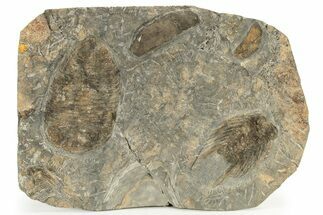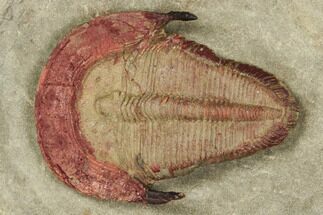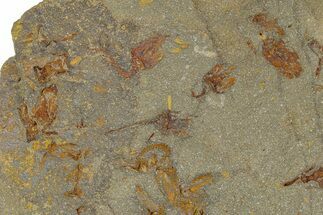This Specimen has been sold.
Trinucleid Trilobites (Declivolithus) - Mecissi, Morocco
This is a pair of Trinucleid trilobites (Declivolithus titan) from Morocco.
This trilobite has really dramatic cephalic pits along its "head shield". The exact purpose of these pits is unknown, but theories are that they could have had sensory purposes or aided in filter feeding.
An Upper Ordovician (Katian) Trilobite Fauna From the Lower Ktaoua Formation, Morocco
This trilobite has really dramatic cephalic pits along its "head shield". The exact purpose of these pits is unknown, but theories are that they could have had sensory purposes or aided in filter feeding.
An Upper Ordovician (Katian) Trilobite Fauna From the Lower Ktaoua Formation, Morocco
About Trilobites
Trilobites are an extinct class of marine arthropods that thrived for nearly 270 million years, from the early Cambrian to the end of the Permian period (around 521 to 252 million years ago). They are one of the most successful and diverse groups in the history of life, with over 25,000 described species spanning a wide range of sizes, shapes, and ecological niches. Known for their distinctive, segmented exoskeletons, trilobites provide invaluable insights into the evolutionary history of arthropods and the dynamics of ancient marine ecosystems.
Trilobites are an extinct class of marine arthropods that thrived for nearly 270 million years, from the early Cambrian to the end of the Permian period (around 521 to 252 million years ago). They are one of the most successful and diverse groups in the history of life, with over 25,000 described species spanning a wide range of sizes, shapes, and ecological niches. Known for their distinctive, segmented exoskeletons, trilobites provide invaluable insights into the evolutionary history of arthropods and the dynamics of ancient marine ecosystems.
SPECIES
Declivolithus (Nankinolithus) titan
LOCATION
Mecissi, Morocco
FORMATION
Lower Ktaoua Formation
SIZE
1.85" & .95" wide on 7.2 x 3.2" shale
CATEGORY
SUB CATEGORY
ITEM
#283912
We guarantee the authenticity of all of our specimens.
 Reviews
Reviews











